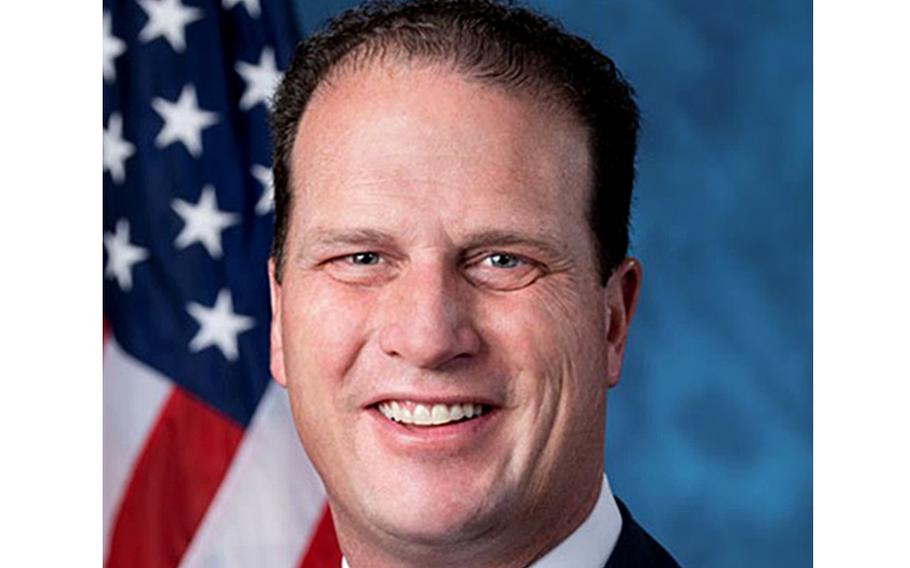
Landstuhl Regional Medical Center in Germany at dusk. Rep. August Pfluger, R-Texas, is questioning Defense Health Agency practices related to the hiring of qualified military spouses at LRMC, the Pentagon’s largest medical facility overseas. (Facebook/Landstuhl Regional Medical Center)
NAPLES, Italy — A U.S. lawmaker wants to know whether the Pentagon’s largest overseas medical facility is denying employment to qualified military spouses in favor of local applicants in Germany.
In a letter last month, Rep. August Pfluger, R-Texas, questioned the Defense Health Agency’s hiring practices at Landstuhl Regional Medical Center.
The letter is addressed to DHA director Lt. Gen. Telita Crosland and seeks information specific to the Defense Department’s hospital near Kaiserslautern, Germany.
Instead of being hired, military spouses often are referred to volunteer for the American Red Cross and “essentially perform the duties and responsibilities of a medical practitioner … without financial compensation,” Pfluger wrote in the Oct. 8 letter, which asked for LRMC’s hiring data for the past five years.
Pfluger also requested information about how the agency is prioritizing military spouses for hiring as well as compensation data for spouses who work in full- or part-time positions at military medical facilities worldwide, among other information.
“If they’re actually prioritizing (people) other than fully qualified spouses, then we want to know what those practices are, what the priority list looks like and how they’re making their decisions,” said Pfluger, a second-term representative who served 20 years in the Air Force as a pilot and now is a colonel in the Air Force Reserve.

Rep. August Pfluger, R-Texas, is asking the Defense Health Agency whether medically credentialed military spouses are being passed over for health care jobs at Landstuhl Regional Medical Center in Germany. (August Pfluger)
A DHA spokesperson confirmed receipt of the letter but said the agency couldn’t address the questions without first formally responding to Pfluger.
The letter echoes decades of frustration by military spouses who say they are forced to quit their well-paying jobs when their family is posted overseas. Due to a multinational pact, most have few employment opportunities when living in Europe.
As a result, many military families must live on one income, dig into savings and sometimes rely on a Defense Department supplemental food program to make ends meet.
There have been some improvements. For example, recent agreements reached in Italy and Spain now allow U.S. military spouses living in those countries to work remotely for their American employers.
That change followed years of policy that forbade the practice unless a military spouse gave up rights and protections afforded them through the NATO Status of Forces Agreement.
But problems persist. The situation has helped to create a pipeline of highly skilled, cheap — and in many cases free — labor exploited by military hospitals and other base organizations, a Stars and Stripes investigation last year found.
For example, military spouses who are nurses, physical therapists or other medical professionals said they were encouraged to give as much as 40 hours a week to the Red Cross or other organizations in the hope that doing so could lead to an eventual paid position.
In Germany, those professionals saved LRMC more than $600,000 in unpaid labor, according to Red Cross figures in 2023.
Asking qualified military spouses to volunteer their medical skills for free is not only unacceptable but also frustrating, said advocate Beth Conlin.
However, a June 2023 White House directive that ordered federal agencies to develop a strategic plan for hiring and retaining military spouses is empowering, she said.
With that power, spouses can better advocate for themselves, directly question a hiring manager about employment practices and ask what is being done to comply with the order, Conlin said.
Still, the DHA should be more proactive in hiring military spouses, which would benefit everyone, she said.
“This is filling the gaps that they have at their facilities overseas,” said Conlin, who chairs the board of the Military Spouse Chamber of Commerce and is an adviser for Blue Star Families. “This is employing military families, and this is improving the care of those that go to those facilities.”
Pfluger said he wrote the letter after learning about the recent experience of a military spouse who wanted to work at LRMC, as well as stories of others who faced similar situations.
When the DHA responds, Pfluger’s office will review the data and evaluate its compliance with federal mandates, he said.
“One hundred percent we will be pursuing any sort of change to the law if we find that that’s not the case and that the hiring practices favor others (over) spouses,” he said.